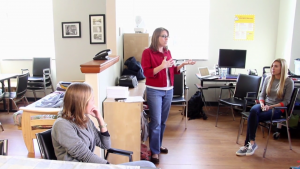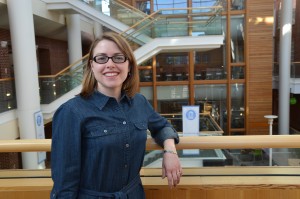Amanda Holliday
May 5, 2016
U.S. Census data show that about 20 percent of the U.S. population will be ages 65 and older by 2030 (tinyurl.com/census-older-adults). Given the increasing needs of that age group, Amanda Holliday, MS, RD, clinical assistant professor of nutrition and licensed dietitian/nutritionist, has dedicated herself to helping ensure proper nutrition for older adults.
“Older people face a lot of nutrition questions that everyone faces: Where am I going to buy my food? What foods are healthy for me?” says Holliday. “But some also have unique challenges, such as decreased appetite, having enough strength and stamina to prepare foods, and eating healthy foods while on a fixed budget.”
In addition, older men and women may need particular knowledge about foods that will help them manage health conditions such as diabetes, arthritis and cardiovascular disease.
In her Nutrition 615 class, Holliday raises awareness of practicing in geriatrics, an area of medicine with which most students have no experience. To help students empathize with the challenges of aging and dementia, the class includes a hands-on exercise in which class members prepare food while encumbered by some of the challenges of aging. Students wear plastic pegs in their shoes to simulate neuropathy, don goggles to simulate cataracts and macular degeneration, use ear buds to listen to sounds that dementia patients report hearing, and wear gloves so they lack dexterity, as is the case with arthritis sufferers.
“My hope is that more students will work with older adults,” says Holliday. “But even if they don’t choose a job in which all of their patients are older, they will have, after this class, more knowledge and empathy when working with people of all ages.”

Holliday, at center, describes to her students some of the challenges related to older adults’ taking in sufficient nutrients. (Image from video by Mary Lide Parker)
With support from a Health Resources and Services Administration grant, Holliday has helped convene a campus-wide geriatric interprofessional education collaborative, which brings together 170 students in nutrition, pharmacy, social work, medicine, nursing, dentistry and other health affairs fields.
“It’s so important to train providers to work together to provide care for older adults,” says Holliday. “Working in geriatrics is just as complex as working with trauma patients.”
—Michele Lynn
Learn more in a March 1 article about how Holliday collaborates with other UNC health affairs schools.
Holliday’s teaching and research in aging also complement the work of many other Gillings School researchers. See sph.unc.edu/cphm/healthy-aging.
Carolina Public Health is a publication of the University of North Carolina at Chapel Hill Gillings School of Global Public Health. To view previous issues, please visit sph.unc.edu/cph.

